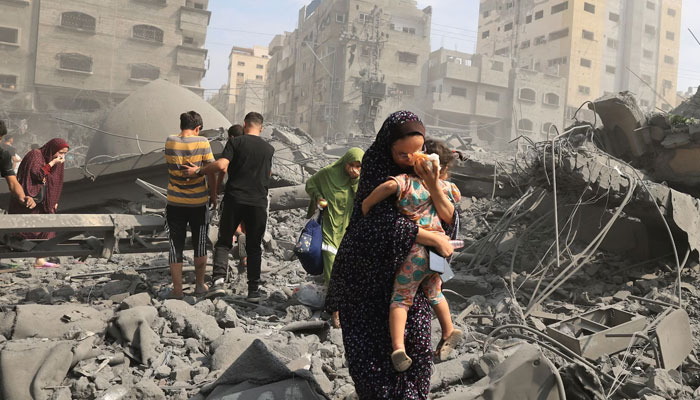
Israel Begins Tactical Pause in Gaza Amid Airdrops as Hunger Crisis Deepens
“It felt like a war,” said 23-year-old Samih Humeid. “I only managed to get three cans of fava beans.”
GAZA CITY — Jordanian and Emirati planes dropped 25 tonnes of humanitarian aid over Gaza on Sunday, as Israel initiated a limited “tactical pause” in military operations to facilitate aid delivery and alleviate growing famine conditions in the besieged territory.
The Israeli military confirmed it also carried out a food airdrop — seven palettes in total — while denying accusations of using starvation as a weapon of war. Prime Minister Benjamin Netanyahu pushed back against what he called United Nations “lies” blaming Israel for the deteriorating humanitarian situation.
“We have always had secure routes for aid,” Netanyahu said during remarks at an airbase. “But today, it’s official. There will be no more excuses.”
The pause — in effect daily from 10 a.m. to 8 p.m. — applies to specific areas where Israeli troops are not actively operating: Al-Mawasi in southern Gaza, central Deir el-Balah, and parts of Gaza City in the north. Israel also announced the opening of “designated secure routes” for aid convoys transporting food and medicine.
UN and Global Reactions
UN Emergency Relief Coordinator Tom Fletcher welcomed the pause, noting UN teams were on the ground and would “do all we can to reach as many starving people as possible in this window.” However, the World Food Programme warned that the crisis is already catastrophic, with one-third of Gaza’s population not having eaten in days and 470,000 people living in “famine-like conditions.”
Germany’s Chancellor Friedrich Merz added to international pressure on Israel, urging Netanyahu to allow “urgently needed humanitarian aid” into Gaza without delay.
Meanwhile, Oxfam’s regional policy lead, Bushra Khalidi, described the latest efforts as a “welcome first step,” but stressed that airdrops and limited truck access are far from sufficient. “What’s needed is a real humanitarian response: ceasefire, full access, all crossings open, and a steady, large-scale flow of aid,” she said.
Chaos on the Ground
Despite the new measures, scenes of desperation were reported. Witnesses described chaos at the site of Israel’s initial airdrop in Gaza City, with crowds scrambling for scarce supplies. “It felt like a war,” said 23-year-old Samih Humeid. “I only managed to get three cans of fava beans.”
In northern Gaza, AFP journalists saw flour-laden trucks arriving via the Zikim crossing from Israel, while Egyptian aid also entered through Rafah, rerouted through Israel’s Kerem Shalom for inspection.
Deaths and Activist Detentions
The Gaza civil defence agency reported that 27 Palestinians were killed on Sunday by Israeli army fire, including 12 near aid distribution sites. These figures could not be independently verified due to restricted media access.
Separately, Israeli naval forces intercepted the Handala, a ship operated by the Freedom Flotilla Coalition, which was attempting to breach Israel’s maritime blockade of Gaza. Israeli authorities detained 21 activists and journalists from 10 countries, transferring two dual U.S.-Israeli nationals to police custody.
Legal and Political Tensions
The tactical pause comes amid growing legal and political scrutiny. In November, the International Criminal Court issued arrest warrants for Prime Minister Netanyahu and former Defence Minister Yoav Gallant, citing “reasonable grounds” to suspect war crimes, including the deliberate use of starvation — charges Israel strongly denies.
Read more: 15% of Pakistani Teens Face Mental Health Problems
Israel launched its Gaza military campaign in response to Hamas’s October 7, 2023 attack, which killed 1,219 people in Israel, mostly civilians. The retaliatory campaign has since killed 59,733 Palestinians, according to Gaza’s health ministry, with the majority reported as civilians.



Comments are closed, but trackbacks and pingbacks are open.